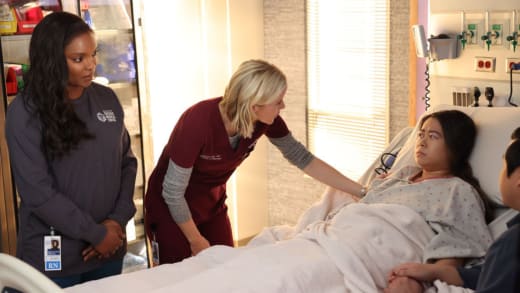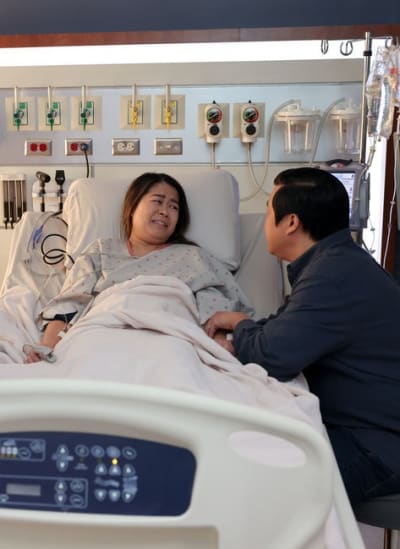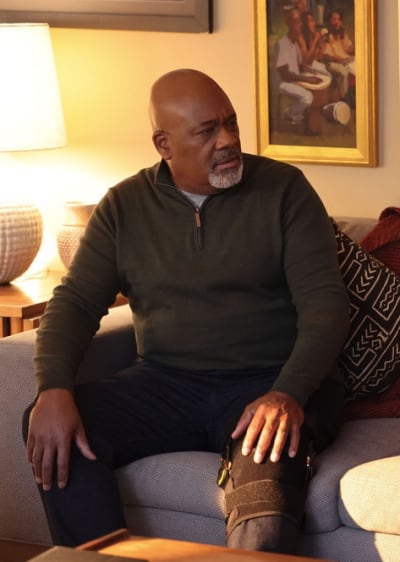Y’all are going to have to give me a minute.
Chicago Med Season 9 Episode 5 brought me to tears several times, which doesn’t usually happen. There was just so damn much loss.
Ripley’s case was the most heartbreaking but it also did the impossible: it made me like Ripley, at least for now.

Since he arrived at Gaffney, Ripley has been little more than a pain in the ass. He couldn’t get past how Charles treated him years ago, seemed always to think he was right, and was so annoying that I was an anti-Ripley/Hannah shipper.
But his reaction to Jimmy’s condition softened him.

Understandably, JImmy’s medical history shook Ripley to the core. They were both victims of inhumane psychiatric practices as kids.
Ripley’s scars are internal, and he doesn’t have cognitive impairments. Still, he must have realized that Jimmy’s fate could have easily been his own.
Ripley: I keep thinking about what kind of life Jimmy might have had if only…
Charles: If only they hadn’t given up on him?
That brought up complicated emotions: regret, sadness, and probably some unexpressed relief that he escaped the kind of horror that had been inflicted on Jimmy.
The little that Ripley learned about Jimmy didn’t shed any real light on what his issues were or why Dr. Sorensen decided to lobotomize him.

As an autistic person, I’m sensitive to the way neurodivergence has been treated throughout history, and I couldn’t help wondering if Jimmy had ADHD or another neurodivergent condition that Sorensen decided to lobotomize away.
Sadly, many mental health issues were treated this way in the not-so-distant past. Psychiatry is an essential branch of medical science, but it has been misused throughout history to harm those who don’t fit in or who are seen as inferior.
Jimmy’s story drove that point home. The lobotomy had compromised his intellectual functioning so much that he couldn’t even understand that Betty had passed away and was confused and upset by her absence.
Ripley wasn’t the only one who couldn’t shake the awareness that Jimmy had been robbed of his quality of life. What a tragedy!

This disturbing storyline also introduced Nurse Nancy. If she’d been on before, I didn’t remember her. Her role as a medical detective was interesting; I enjoyed how she helped solve the mystery of who Jimmy was and how best to help him.
Nancy: I dug through the archives and I did find a Dr. Sorensen.
Ripley: Great. Can we contact him?
Nancy: I’m afraid not. He died 50 years ago.
Ripley: Well, he won’t be much help then.
The Jimmy storyline was painful enough; we also had two other stories revolving around loss — three if you count Maggie’s sadness over the end of her marriage. (I still think that one is a split for the sake of drama, and it annoys me too much to take it seriously.)
Bert’s dementia story is realistic so far. The saddest part of this story is its effect on Sharon.
Sharon had moved on with her life. She and Bert had separated but remained friends, and she recently started dating Dr. Washington. But now, everything’s on hold while she tries to get Bert to agree to testing.

She seemed as if she was still married to him as she begged him to get a physical and, later, to consent to more testing to determine the extent of the problem.
Bert’s sudden paranoia about his pension, followed by his agreement to do the testing once he calmed down, was disturbing. Paranoia is a common symptom of Alzheimer’s disease; if he’s already exhibiting it, that’s not a good sign.
Up until that point, his symptoms were inconclusive. He was only half paying attention when Charles suggested lunch, and anyone can make a careless arithmetic error, even if they had once memorized their times tables.
Bert: This was a setup from the beginning. You brought me in here for this.
Sharon: I apologize, Bert, but Tara has been so worried.
Bert: Don’t put this on Tara. This was you, and you’re in on it too. You want to put me away so you can get your hands on my pension. Couple of crooks.
Charles: Bert. How long have we been friends? 40 years?
Bert: 40 years, but not anymore. And what was that law power I gave you?
Sharon: Power of attorney.
Bert: Yeah, that. I don’t want you to have that anymore.
But his response to the suggestion that he get further testing went beyond defensiveness. He might have been speaking out of anger, but that anger came from a delusional belief about Sharon and Charles wanting his money.
I’m glad Tara pushed Sharon to take this seriously. Bert can’t take adequate care of Isaiah if he’s having these kinds of mood swings and paranoid thoughts!

If you’ve lost someone in your family to dementia-like I have, you’ll probably want tissues by your side for the foreseeable future. Bert agreed to do the tests to prove Sharon wrong. But I can almost guarantee that those tests will prove there’s something to worry about.
Dean Archer also caught a sad case and showed a far more human side during it than he would have been capable of a few short years ago.
Archer observed ethical guidelines as closely as possible (though Sean shouldn’t have been present while doctors were actively working on his friend!), even asking for permission before sharing medical information with Sean.
This isn’t the same man who deliberately let a patient lapse into a coma so that he could supersede their wishes. Not by a long shot.

Archer also managed to be non-judgmental about the possibility that Damon had relapsed into drug use. He asked to get information, not to look down on Damon for his choices.
That, too, demonstrated a level of maturity that Archer never had before. Maybe his former grouchiness was because of his kidney disease; now that he’s feeling better, he’s a lot nicer and easier to tolerate on my screen.
Damon’s story was also heartbreaking. He went from bad to worse almost immediately and had little chance of survival, but Sean believed in his father’s medical powers with almost childlike certainty.
It’s possible Damon hadn’t relapsed, but that his body had been so weakened by his former drug use that he picked up an infection he should have been immune to.
When that happens, it seems unfair. The person has decided to turn their life around, but it is too late.

Hopefully, the death of his patient won’t cause Sean to relapse. Dr. Collins said she’d talk to him, but I’m unsure I trust her.
It was weird that she appeared out of nowhere and asked to sit with Damon minutes before he crashed.
This isn’t Days of Our Lives, where bad actors easily access patients to harm or kill them, but I still found it suspicious.
Asher’s story revolved around the unintended byproduct of banning abortion: preventable illness and death of women who suffered a miscarriage.

This type of story is difficult to pull off. Abortion is such a hot-button issue in the United States that taking a stand on it will alienate viewers who have a different point of view.
I think Med pulled it off for the most part — how about you? There were no big speeches about abortion access; there was simply a patient who nearly died because her doctor feared arrest if she did a necessary procedure that resembled abortion.
The A word was never spoken on air, and viewers were left to make up their minds about whether anti-abortion laws are at fault for tragedies like this.
Some viewers may feel that any suggestion that anti-abortion laws are wrong is “too woke,” but it’s realistic for a hospital to deal with the consequences of these laws. The word ‘abortion’ was never used, and no character commented on abortion laws themselves.

Zola and Marcel’s story was interesting, but I’m unsure what the point was. The board refused to pull the drug, and Marcel told Zola to leave it alone and the next scene featured Zola helping comfort Maggie after she got her divorce papers signed.
There has to be more to it than this. Zola’s upset lasted about five seconds, and then she gave up, which isn’t typical of her.
Maybe she’s growing up, but I expect her to do something underhanded to get her point across.
I’m relieved she had the sense not to tell Alex’s parents that the drug might have caused his near-fatal reaction!

What did you think, Chicago Med fanatics?
Hit the big, blue SHOW COMMENTS button and let us know.
Chicago Med airs on Wednesdays at 8/7c.
Jack Ori is a senior staff writer for TV Fanatic. His debut young adult novel, Reinventing Hannah, is available on Amazon. Follow him on X.


























































![Mason Ramsey – Twang [Official Music Video] Mason Ramsey – Twang [Official Music Video]](https://i.ytimg.com/vi/xwe8F_AhLY0/maxresdefault.jpg)



















